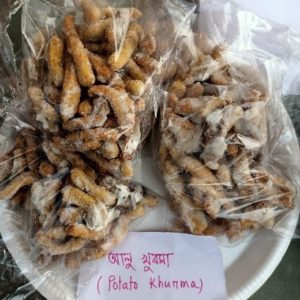There is, perhaps, no vegetable in the world as versatile as the potato. And farmers in Assam, India, are proving this fact by developing numerous innovations to bring new products into local markets.
The innovations have been created through Value Chain Schools (VCS) within the Assam Agri-Business and Rural Transformation Project (APART) – a project dedicated to fostering entrepreneurial skills among small and marginalized farmers in Assam. The International Potato Center (CIP) is providing consultancy services to facilitate activities for developing a potato value chain in Assam.
APART is promoting VCSs in Assam to participate at all levels of the potato value chain, from planting and harvesting to processing and marketing. To date, the initiative has supported 14 schools in 7 districts with 20-25 farmers per group, including more than 30% women in each of the groups.
“Because male farmers are mostly busy with farming operations, the VCS initiative is an opportunity for women to develop an alternative livelihood option,” says Bijoy Goswami, a senior research associate with CIP. “Not only do they learn to develop new products, but they are also trained in skills of business operation, such as finance and marketing. And they can teach these skills to their children. The inclusivity of women is the key to success.”
Most of these farmers have toiled on the less profitable end of the value chain with maximum labor with the smallest share of the profits. They look to this program to find new ways to increase their profits with novel ideas for potato products in the market. In short, they are looking to “potatofy” traditional potato offerings – adding value with innovation.
Sweets are very common with Indian meals – for breakfast, lunch or dinner, everyone likes a bit of sweet.

In rural India, khurma is a popular treat, typically made from dough, fried in oil and soaked in sugar syrup. The VCS groups have been developing a potato-based khurma and the initial results are positive on taste. And the potato khurma is gluten-free making it available for people who cannot digest wheat products.
Pickling is centuries old tradition to preserve food for long-term consumption and in India many things are pickled – mango, lemon, chili, garlic, carrots and more. Two VCS groups are developing pickled rangpuria, a potato landrace in Assam with a high shelf life and popular taste. The developers are hoping pickled rangpuria will be popular on its own, but also note the potential to combine it with other high value crops like King chili to enhance its marketplace value.
“We hope that potato-fied innovations like khurma and rangpuria will encourage rural entrepreneurs to invest more in potato,” says Goswami. “The next step will be to encourage state agencies to provide financial avenues to incentivize these entrepreneurs and everyone else along the value chain. In the end, we will see improved economic opportunities for many small farmers and women.”
Blog by Bijoy Goswami Bijoy, Senior Research Associate CIP
